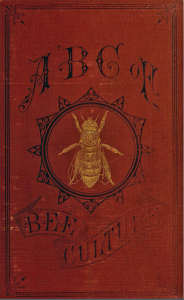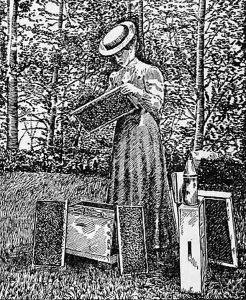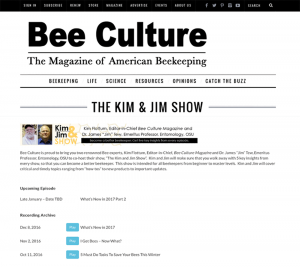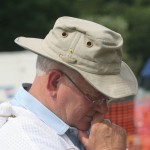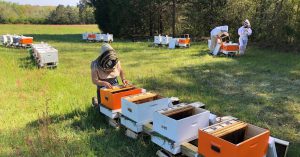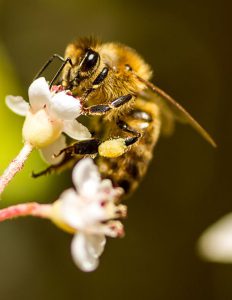By: James E. Tew
This month can we just talk?
Today is dark, cool, and raining. Good time for conversation.
In this article, can we just talk for a bit? I know that Winter kills, making splits, ordering packages and other such topics are common threads at this time, but I would just like to chat for a while. I don’t mean only to reminisce, reflect or predict, but just talk about bees and beekeeping for a bit – and yes – and some other stuff, too.
If you have kept bees long enough, you know that our craft becomes a descriptor for our lives. In the grocery store as I try to decide if I will eat whatever it is that I am considering purchasing, I get, “Hey, Jim, how are the bees? I heard they are all dying?” “That’s really too bad!” “Bees are important you know!” Actually, I do know that bees of all species are under stress, but at that moment, I only wish to decide if I want sardines that are packaged in Poland or China.
In church, I get something like, “Good morning Jim, I saw where bees are now endangered.” “That’s not good!” (Then from a nearby parishioner who cuts in, “Hey, don’t upset him. He’s got millions of defenders that he can unleash on you!”) All the while, we are handshaking and back patting – just socially interacting. While I don’t mind the attention, in some form, it is nearly every trip to the grocery, to buy gas, restaurants, or church that such interactions occur. (Plus, it was a species of bumbles and not honey bees that were recently listed as endangered. Should I have gone into that with my friend or just move along my way? I chose to move along.)
I’m glad people feel comfortable speaking to me about bee things, and in my own way, I am helping bees by encouraging people to read and remember bee news items so we can interact. As a beekeeper, you do exactly the same thing and the same thing happens to you. You understand what I am talking about.
What’s in a name?
This bee intro thing is a lot like common interactions with my surname, “Tew”. At a piano recital in which my grandson had just finished playing, a fellow completely unknown to me said, “Tew – that’s an Anglo-Saxon name from the London, England area.” I was truly stunned. He was the first person in my entire 68 years to know my name’s derivation. He said it with complete confidence and knowledge. He was correct and yet, I don’t know who he was.
A few years ago, my wife and I visited Great Tew, Lesser Tew and Dunn Tew all in the outskirts of London. It was truly an interesting part of my life to visit the area where some of “my folk” (apparently) once lived. (No doubt, my ancestors were kitchen staff in some manor house.)
To many, if not most people, my surname sounds Asian. I can understand that perception, and there is no harm in the thought. During the Vietnam War years, Nguyen Van Thieu1 was president of South Vietnam. Thieu (sounding very much like Tew) was frequently on national news. That was a confusing time for all Tews.
It is interesting to me that people readily pronounce words like pew, dew and few but when confronted with Tew, they tend to pronounce it Twe (rhyming with “tree”). Of course, relating my name to one, two, three is always a hoot for some. It’s okay; I’ve grown completely accustomed to it. It’s a common conversational ice breaker.
Why am I putting you through all this?
I am an oddly named guy who keeps bees – which is also odd to most people. It could sound like this at a noisy social event – a stranger reads my name badge and cautiously asked, “Is that pronounced Twe?” Then very shortly thereafter upon explaining that I am there for beekeeping, within the hubbub, the stranger will again tentatively ask, “Did you say bookkeeping?” I have few doubts that as our conversation ends and he moves on, he must be thinking “Well, that was certainly a strange guy.”
Why am I putting you through all of this? Because we all are beekeeping promoters – even when we do not particularly want to be. But our beekeeping interest is something that other people can use to interact with us. It makes for easy – if not predictable – conversation and pleasant social interactions.
Can you believe this?
Only a few minutes ago, I got a county extension office request to suggest a beginning beekeeping book for a class in which I will be involved. Piece of cake, right? I have no idea which one to choose.
Hardly 10 years ago, I purchased just about any bee book that came to the market on just about any bee subject. Not now. There are too many new (and old) ones available. I confess that I did not buy a lot of cookbooks, or fictional bee pieces, but even a few of those books would occasionally call to me. Currently, beekeepers new and old are awash in new (and old) bee books. Choosing one written text for a county extension educator is a surprising task.
Within iBooks alone there are 73 bee digitized title listings that I could quickly find. In our new, electronic world, essentially, anyone can be an author (or photographer). To get on top of the bee book pile, some authors use titles with something like super adjectives or hyperbola. (I was going to list some “extreme” examples of titles and descriptors, but I do not mean to highlight or insult any author.)
But iBooks are only an infant compared to the listing in Archive.org. If you want to review what must be hundreds and hundreds of bee books and even download – free – to your reading device to read at your leisure, you can do it at this site. There are videos, webinars and podcasts also. The amount of information is staggering – once again – for free.
For example, amongst all the old and new books that are archived, a host of early versions Root’s The ABC of Bee Culture – A Cyclopedia of Every Thing Pertaining to the Care of the Honey Bee; Bees, Honey, Hives, Implements, Honey Plants, etc., Facts Gleaned from the experiences of thousands of Bee Keepers All Over Our Land and Afterward Verified by Practical Work in Our Own Apiary. Is that a title or what??!
Of all the hundreds available, I randomly moved on to E.F. Phillips, “Beekeeping – A Discussion of the Life of the Honey Bee and of the Production of Honey.” (1915). Dr. Phillips included a short review of women in beekeeping in his beautiful old book. He came so very close to being greatly ahead of his time one hundred and two years ago, but alas, he blotched it. He wrote that women could easily become beekeepers and be very proficient at the craft, (good, good) but they could never excel without a man to provide physical labor. (Boom!) But that was the only limiting factor he gave – physical strength. In every other way, women beekeepers were as able as men. It is not for me to decide how much credit he should be given for acknowledging women beekeepers so long ago. At least, he mentioned them. The remainder of the book is sterling. The line drawings are great.
My comments here are not a comprehensive review of Internet resources.
I am unqualified to offer anything other than fortuitous resources that I have stumbled across or that others have directed me to. Indeed, as a newish senior citizen, I work daily to keep up with electronic changes and advances. I am doomed to lose this race, but how I do enjoy trying. My justification for all my electronic efforts is my fundamental love of beekeeping.
The amount of information on the Internet (both correct and incorrect) is astounding – if you can figure out how to get to it. Try not to be sidelined into buying replacement windows or be prodded into downloading suspicious software that is guaranteed to speed up your computer. (…and when you are not using it, cover the camera on your computer.)
More stumbling onto bee stuff.
I have the same TV set up that everyone else has. It offers more television than I could ever watch in several lifetimes. Maybe it’s just me, but it seems that most of it is not for me. From my perspective, there are some good programs out there, but finding them takes some serious time.
My daughter suggested that my wife and I tune into a series called Black Mirror. The series has been on since 2011, but since I apparently live in a cave and am always the last to know anything, I was not aware of the program. It is suppose to be a latter-day Twilight Zone. I liked the program reasonably well but it is not something that I just could not miss. (This is not a TV program review. I have no qualifications to judge such things.) Last night, a Black Mirror presentation entitled, “Hated in the Nation” came up on my list. It aired on October 16, 2016.
I popped some corn. My wife and I settled in for some “typical” TV. Typical TV cops investigating a couple of mysterious murders. The program was set a few years in the future. The story line unexpectedly broke away to what appeared to be a honey bee on a blossom. It was robotic bee – a drone. Not a male bee but an autonomous flying machine. (I didn’t see that coming.) A complex explanation followed. “As CCD continued to kill off pollinators, the ecosystem became unstable.” (Remember, this is TV jargon.) A robotic pollinator was developed that was based on (oh so very loosely) honey bee biology. These robotic bees formed hives where they in computer/robot fashion reproduce themselves. Off they did go – in vast numbers – to robotically pollinate flowers. But wait, as murders continued, it was discovered that there was a sinister government shadow plan to use mechanical bees for other sordid purposes. From there, the plot thickened and became interestingly goofy.
When does a reviewer stop? I suppose there is a slight chance that some of you Netflix bee people will check it out. It cannot be considered educational TV. A loud warning – there is a significant amount of gratuitous foul language used in this show.
If you could only be here…
In the same vein of Internet resources and robotic bees, there are reasonably well-developed systems for streaming video from multiple sites to an even greater number of download sites. Skype is the best-known system, but there are many other systems available. Go To Meeting, Zoom, Adobe Connect and Scopia are some that I have used, but I am still a neophyte. Video conferencing was in its infancy when I retired from Ohio State more than five years ago. It rages now.
When these video streaming events are being set up, someone must always say what everyone is thinking, “It would be so much better if you could just come here.” (A sad sigh follows the comment) In no way do these digital events supersede the presence of a speaker, but it slashes the amount of time and money required to get the information out. The procedure greatly reduces the speaker’s time commitment. But do not fear, live speaker-lead presentations will not be vanishing anytime soon.
Editor Kim and I (It was not my idea. No credit is due me.) are developing a procedure for using video-conferencing in a production named The Kim and Jim Show that we’ve done about four times now. More episodes are in planning and we hope to move outside when the weather changes. That will probably be good for several audience laughs.
Simply stated, events like these are terrifying to develop and produce. Why? Because there are so many variables – some that demand simple good luck. It is very easy to look really inadequate in short order when things go wrong while you are “live”. This form of presentation must be a bit like a performer from silent movies trying to develop a persona in speaking movies. Speaking to a group and speaking to a computer screen are NOT the same thing.
There was little that I did in my earlier career to prepare me for this format. Other than occasional texts, there is little audience feedback. There are no IT specialists in my shop when we are live. I am alone. Any problem is my problem – live. Whatever dumb thing I say is being recorded and will be played again and again and my chair is prone to squeak when I pivot. Is my audio still on? Drat! I should have covered all that junk behind me. Maintain eye contact!
Certainly others are using this technology. Kim and I are not unique. The ones we have done are parked at: Beeculture.com. Once there, in the very top black ribbon, pull down the category “Events” and then click on Kim and Jim. One of the presentations had audio issues, but even so, a photo deck of the show is posted there.
A beekeeping canon.
I want to know more from you who have used the oxalic acid canon that is used to fumigate colonies in hives without opening or really doing much with them. I know nothing about it. I’m still becoming confident with the oxalic acid wand.
Thanks to all who read to this point.
Thank you for reading to this point. I realize this has not been a typical piece for you and me. I will be back to typical next month.
1While confirming spelling and pronunciation, I found that Thieu died in 2001 at 78 years old in Boston, MA.
Dr. James E. Tew, State Specialist, Beekeeping, The Alabama Cooperative Extension System, Auburn University; Emeritus Faculty, The Ohio State University. Tewbee2@gmail.com; http://www.onetew.com; One Tew Bee RSS Feed (www.onetew.com/feed/); @onetewbee ; http://www.facebook.com/tewbee2; Youtube: https://www.youtube.com/user/onetewbee/videos





